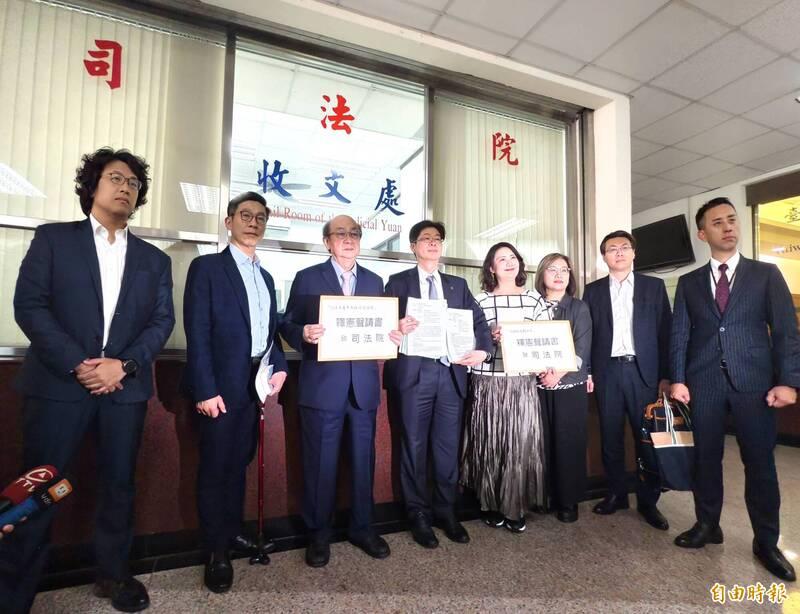Democratic Progressive Party (DPP) legislators today submitted a petition to the Judicial Yuan to request a constitutional interpretation of the 2025 central government budget and amendments to the Act Governing the Allocation of Government Revenues and Expenditures (財政收支劃分法), promulgated earlier this year.
The Legislative Yuan passed the third reading of the budget allocation amendments, which were proposed by the Chinese Nationalist Party (KMT), on Dec. 20 and the 2025 budget on Jan. 21.
However, the Executive Yuan approved two reconsideration proposals on Feb. 27 which were sent to the president for approval.

Photo: Wang Yi-sung, Taipei Times
However, on March 12, the Legislative Yuan rejected the reconsiderations with the combined votes of the KMT and the Taiwan People’s Party (TPP) and the bills were promulgated by the president on March 21.
The Constitutional Court has strong grounds to rule both the budget and the allocation law unconstitutional, DPP caucus whip Ker Chien-ming (柯建銘) said today.
The DPP is seeking constitutional interpretation for three reasons, he said.
Firstly, the budget reductions are unclear and contravene the principle of legal clarity, he said.
Secondly, the Legislative Yuan’s request for the Executive Yuan to adjust and reduce the budget contravenes the constitutional principle of separation of powers, he said.
The Constitution states that branches must work independently, though the Executive Yuan is responsible to the Legislative Yuan.
Thirdly, the amendments contravene Article 49 of the Budget Act (預算法) and thereby the rule of law.
Regarding the allocation law amendments, the DPP also has four key concerns, he said.
The amendments drastically reduced financial resources available to the central government, directly altered the fiscal structure between central and local governments and widened the urban-rural gap, which contravenes Article 147 of the Constitution, he said.
Moreover, it failed to simultaneously review the division of responsibilities between central and local governments, which undermined central fiscal capacity, he added.
As parts of the budget are already being unfrozen, there is no need to apply for provisional measures, he said.
KMT caucus secretary-general Wang Hung-wei (王鴻薇) today stated her opposition to the DPP petition.
Wang said the DPP is abusing the power of the Constitutional Court by using it as a political tool, petitioning to them whenever amendments do not meet the approval of the party and undermining the Legislative Yuan.
As such, the DPP is undermining the Constitution and causing political chaos, she added.
The DPP has already filed requests for the constitutional interpretation of legislative reforms for the Constitutional Court Procedure Act (憲法訴訟法) and the Civil Servants Election and Recall Act (公職人員選舉罷免法), she said.
It is therefore unprecedented to request interpretation of another two items, she added.
The Lai administration initially wanted the budget passed quickly, and the Legislative Yuan is already reviewing proposals to unfreeze parts of the budget, so the DPP is the party which is blocking the budget, she added.
Additional reporting by CNA

Taipei has once again made it to the top 100 in Oxford Economics’ Global Cities Index 2025 report, moving up five places from last year to 60. The annual index, which was published last month, evaluated 1,000 of the most populated metropolises based on five indices — economics, human capital, quality of life, environment and governance. New York maintained its top spot this year, placing first in the economics index thanks to the strength of its vibrant financial industry and economic stability. Taipei ranked 263rd in economics, 44th in human capital, 15th in quality of life, 284th for environment and 75th in governance,

Greenpeace yesterday said that it is to appeal a decision last month by the Taipei High Administrative Court to dismiss its 2021 lawsuit against the Ministry of Economic Affairs over “loose” regulations governing major corporate electricity consumers. The climate-related lawsuit — the first of its kind in Taiwan — sought to require the government to enforce higher green energy thresholds on major corporations to reduce emissions in light of climate change and an uptick in extreme weather. The suit, filed by Greenpeace East Asia, the Environmental Jurists Association and four individual plaintiffs, was dismissed on May 8 following four years of litigation. The

A former officer in China’s People’s Liberation Army (PLA) who witnessed the aftermath of the 1989 Tiananmen Square massacre has warned that Taiwan could face a similar fate if China attempts to unify the country by force. Li Xiaoming (李曉明), who was deployed to Beijing as a junior officer during the crackdown, said Taiwanese people should study the massacre carefully, because it offers a glimpse of what Beijing is willing to do to suppress dissent. “What happened in Tiananmen Square could happen in Taiwan too,” Li told CNA in a May 22 interview, ahead of the massacre’s 36th anniversary. “If Taiwanese students or

The New Taipei City Government would assist relatives of those killed or injured in last month’s car-ramming incident in Sansia District (三峽) to secure compensation, Mayor Hou You-yi (侯友宜) said yesterday, two days after the driver died in a hospital. “The city government will do its best to help the relatives of the car crash incident seek compensation,” Hou said. The mayor also said that the city’s Legal Affairs, Education and Social Welfare departments have established a joint mechanism to “provide coordinated assistance” to victims and their families. Three people were killed and 12 injured when a car plowed into schoolchildren and their